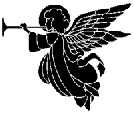

Holy Trinity
Amblecote
The Church’s Liturgical year is divided up into times and seasons and each has a particular focus. These different times celebrate different aspects of the life of Jesus.

The Season of Advent
Advent Sunday is either the last Sunday in November or the first in December therefore the season of Advent can vary in length from year to year. It covers the four Sundays before Christmas Day and all the weekdays between the first Sunday of Advent and Christmas Day. It is during this period that the Church prepares for the celebration of the Lord's birth at Christmas.
The First Sunday of Advent, The Second Sunday of Advent, The Third Sunday of Advent, The Fourth Sunday of Advent, Christmas Eve
The Christmas Season
This period is the celebration of the Birthday or First Coming of Jesus when he was born in Bethlehem, and the Son of God became man.
Christmas Day, The First Sunday of Christmas, The Second Sunday of Christmas
Epiphany
This commemorates the revealing or ‘showing forth’ of the Divine Nature first to the Wise Men from the East. It is observed on January 6th. The Sunday after Epiphany celebrates the Baptism of Jesus. There are two to six Sundays after Epiphany and so this season again varies in length from year to year.
The Epiphany (6th January), The Baptism of Christ -

Ordinary Time
This begins on the day following the Presentation of Christ in the Temple or Candlemas – celebrated on 2nd February and continues until the Sunday next before Lent.
The Fifth Sunday before Lent ,The Fourth Sunday before Lent, The Third Sunday before Lent -
The Season of Lent
This is a solemn period of discipline, repentance and growth and lasts approximately forty days (not including Sundays). The period commemorates Jesus’ special preparation in the wilderness at the opening of his ministry. The season begins with Ash Wednesday, so called because on this day ashes are blessed and distributed in remembrance of the Old Testament custom of casting aside expensive garments and putting on sackcloth and ashes to symbolise atonement from sin. The fourth Sunday in Lent is often kept as Mothering Sunday. The fifth Sunday is called Passion Sunday. Next comes Palm Sunday, when Jesus entered into Jerusalem for the final week of teaching in the Temple and this week is known as Holy Week.
Ash Wednesday, The First Sunday of Lent, The Second Sunday of Lent, The Third Sunday of Lent, The Fourth Sunday of Lent,The Fifth Sunday of Lent, Palm Sunday, Monday of Holy Week, Tuesday of Holy Week, Wednesday of Holy Week

The Easter Triduum
A period of three days from the end of Lent on Wednesday of Holy Week until the Easter Vigil
Holy Thursday (or Maundy Thursday) This is the day when Christ instituted the celebration of the Last Supper immediately before he went to the Garden of Gethsemane. Here he was betrayed, and taken away for trial before Caiaphas, the Jewish High Priest, in the early morning of Good Friday and afterwards condemned to death by the Roman Governor Pontius Pilate.
Good Friday Jesus was crucified and after death his body was removed from the cross and placed in a tomb by Joseph of Aramathea.
Holy Saturday During this day there are no celebrations of the Eucharist and Holy Communion is not given in Church. Near to midnight the Easter Vigil takes place which celebrates the fact that Christ has risen and destroyed the power of sin and death.

The Easter Season
This begins with the celebration of the Easter Vigil and continues until Pentecost some fifty days later.
Easter Sunday
Jesus rose from the grave on the first day of the week (Sunday) and Christians celebrate this great event on a weekly basis. There follows the great Forty Days, when Christ appeared to the disciples, and others, teaching and preparing them for the time when he would no longer be with them.
Monday of Easter Week, Tuesday of Easter Week, Wednesday of Easter Week, Thursday of Easter Week, Friday of Easter Week, Saturday of Easter Week,
The Second Sunday of Easter, The Third Sunday of Easter, The Fourth Sunday of Easter, The Fifth Sunday of Easter, The Sixth Sunday of Easter, The Seventh Sunday of Easter.
Rogation Days
These are four days set aside to bless the fields. "Rogation" from the Latin 'rogare' means "to ask" in this case for Gods mercy on all creation. April 25th (the Feast of St Mark) is known as the Major Rogation and the three days before Ascension Day are called the Minor Rogations. In the past the Parish boundaries were walked accompanied by the reciting of a Litany of Mercy -
This is the fortieth day after Easter and always falls on a Thursday and commemorates the day when Christ ascended to the Father.



Pentecost
Whitsunday commemorates the disciples receiving the gift of the Holy Spirit after a period of ten days of waiting and prayer in the Upper Room in Jerusalem. Whitsunday is also called Pentecost and is often known as the birthday of the Church. It was a favourite day for Baptism.
Ordinary Time
This is resumed on the Monday following the Day of Pentecost and continues until 'Christ the King' – The Sunday next before Advent.
Trinity Sunday
This follows one week after Pentecost. Here the Church acknowledges the glory of the Eternal Trinity, Father, Son and Holy Spirit. For the remaining twenty five Sundays of the year the Church considers the great teachings and lessons of the faith.
Corpus Christi
The Feast of the Body of Christ. This feast is celebrated on the Thursday after Trinity Sunday to solemnly commemorate the institution of the Holy Eucharist.
The First Sunday after Trinity, The Second Sunday after Trinity, The Third Sunday after Trinity,
The Fourth Sunday after Trinity, The Fifth Sunday after Trinity, The Sixth Sunday after Trinity, The Seventh Sunday after Trinity, The Eighth Sunday after Trinity,The Ninth Sunday after Trinity, The Tenth Sunday after Trinity,The Eleventh Sunday after Trinity, The Twelfth Sunday after Trinity, The Thirteenth Sunday after Trinity, The Fourteenth Sunday after Trinity, The Fifteenth Sunday after Trinity, The Sixteenth Sunday after Trinity, The Seventeenth Sunday after Trinity, The Eighteenth Sunday after Trinity, The Nineteenth Sunday after Trinity, The Twentieth Sunday after Trinity, The Twenty-
The Transfiguration of Jesus
This was an event reported by the Synoptic Gospels in which Jesus is transfigured upon a mountain (possibly Mount Tabor) (Matthew 17:1-

Ember Days
A day reserved for prayer and fasting observed on Wednesday, Friday and Saturday after the first Sunday of Lent, after Whitsunday, after September 14th, and after December 13th. These quarterly periods take place around the beginnings of the four natural seasons. Four times a year, the Church sets aside three days to focus on God through His marvellous creation.
Holy Cross Day
This feast, which is celebrated on September 14th, is translated from the Greek as "Raising aloft of the precious cross" and in Latin as "Raising aloft of the holy cross". In the Anglican Communion the feast is called Holy Cross Day which is the name also used by the Lutheran Church. This day is an occasion to commemorate, and glory in, the Cross of Christ which was a shameful and humiliating instrument of death that became the means of life eternal.
Saints Days
These are when the Church honours its heroes. The Apostles are each commemorated and also some of the greatest of the Saints, and all are remembered on All Saints' Day (1st November). The Blessed Virgin Mary is honoured on two days, the Purification or Candlemas (February 2nd), and the Annunciation or Lady Day (March 25th). On the feast day of Michael & All Angels -
 Go to top
Go to top